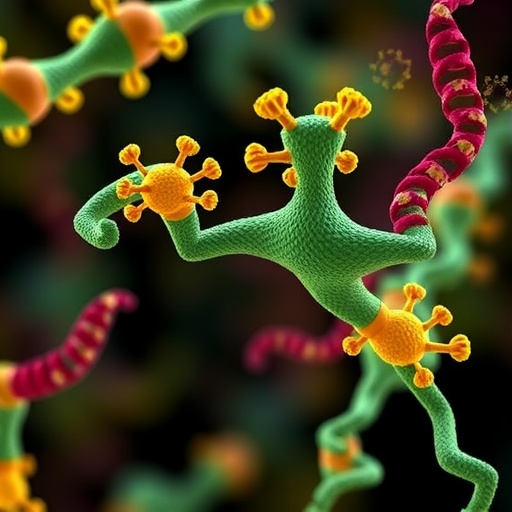In a landmark study published in Nature Communications, scientists at the Linda Crnic Institute for Down Syndrome, located at the University of Colorado Anschutz Medical Campus, have unveiled a novel understanding of the dynamic physiological landscape throughout the lifespan of individuals with Down syndrome. Through the extensive analysis of over 300 participants, this research delineates how trisomy 21, the chromosomal anomaly underpinning the syndrome, influences human biology in age-dependent and stage-specific fashions.
The investigation forms a core component of the Human Trisome Project, an ambitious, comprehensive cohort endeavor that integrates deep clinical phenotyping, multi-omics technologies, and biobanking to provide an unparalleled resource for the study of Down syndrome. By coupling high-resolution molecular profiling with longitudinal clinical data, the researchers have charted a temporal atlas of biological alterations attributable to the triplication of chromosome 21.
Blood specimens analyzed from participants spanning infancy to late adulthood revealed that trisomy 21 incites a complex interplay of biological perturbations that evolve with age. While certain dysregulations, such as hyperactivity within immune pathways and disrupted oxygen metabolism, pervade all life stages, other molecular and cellular anomalies manifest selectively during discrete developmental windows, including childhood and adulthood. This nuanced age specificity challenges prior notions that the effects of trisomy 21 are uniformly static throughout life.
Joaquín Espinosa, PhD, executive director of the Crnic Institute and principal investigator of the Human Trisome Project, emphasized the groundbreaking implications of these findings, noting the revelation that trisomy 21 carries distinct biological footprints during different life stages. Such discoveries underpin the potential to tailor medical interventions more precisely, optimizing therapeutic efficacy based on the age-related biological milieu of affected individuals.
Moreover, lead contributor Neetha Paul Eduthan, MS, highlighted the differential gene expression, metabolite levels, protein profiles, and immune cell distributions unique to each age cohort. The sheer number of molecular alterations confined to specific ages exceeded those common across the lifespan, underscoring the importance of age-tailored research and clinical strategies in Down syndrome.
To contextualize the findings related to trisomy 21, the research team conducted parallel analyses centered on sex chromosome effects, examining biological distinctions between sexes. Micah Donovan, PhD, co-lead author and pharmacology instructor, detailed how puberty serves as a pivotal biological inflection point, whereby gene regulation, immune competence, and metabolic networks diverge sharply between males and females, a dynamic largely absent in early childhood.
The employed computational frameworks transcended traditional linear models of aging, uncovering eight primary temporal trajectories governing transcriptomic, proteomic, metabolomic, and immunophenotypic variations in the bloodstream. This intricate mapping spanning from infancy to the sixties reveals aging as a multifaceted, non-linear biological process profoundly reshaped by trisomy 21, offering a heretofore unseen depth of insight into developmental biology.
The analytical precision and scale epitomized by these findings lay foundational groundworks for ensuing research efforts. In particular, the Crnic Institute has initiated investigations into musculoskeletal deficits and accelerated immunosenescence characteristic of Down syndrome, endeavors poised to elucidate mechanisms underlying comorbidities and inform novel treatment paradigms.
Michelle Sie Whitten, president and CEO of the Global Down Syndrome Foundation, an essential collaborator in this initiative, underscored the transformative potential of these discoveries to revolutionize care. She emphasized that the age-specific biological insights could extend lifespan and enhance quality of life for millions globally, facilitated by ongoing national initiatives such as the NIH’s INCLUDE Project, which supports this and related studies.
The Crnic Institute, uniquely dedicated to Down syndrome research, harnesses multidisciplinary expertise across basic science, translational applications, and clinical investigations. Through partnerships with leading foundations and the University of Colorado, the institute drives forward an integrated research agenda aimed at unraveling the complexities of trisomy 21 biological effects and accelerating therapeutic breakthroughs.
The University of Colorado Anschutz Medical Campus stands as a beacon of innovative health research and clinical excellence, embedding this study within a broader ecosystem encompassing multiple health professions schools and nationally ranked hospitals. Its robust research funding and interdisciplinary ethos amplify the impact and reach of advances in Down syndrome science.
The Global Down Syndrome Foundation complements the Crnic Institute’s scientific efforts by advocating for research funding, disseminating medical care guidelines, and promoting community engagement through philanthropic and awareness programs. This synergy fosters an environment where scientific discovery is seamlessly translated into enhanced clinical resources and patient support.
Collectively, this paradigm-shifting research spotlights the intricate and evolving nature of trisomy 21’s biological influence, reframing Down syndrome as a dynamic developmental condition. These revelations hold promise for catalyzing the next generation of personalized medical strategies that honor the biological individuality of each person with Down syndrome.
Subject of Research: Physiological and molecular changes in individuals with Down syndrome across different life stages
Article Title: Life Stage-Specific Biological Alterations in Down Syndrome Revealed by Large-Scale Multi-Omics Analysis
News Publication Date: September 24, 2025
Web References:
- Nature Communications Article DOI
- Linda Crnic Institute for Down Syndrome
- University of Colorado Anschutz Medical Campus
- Global Down Syndrome Foundation
References:
Joaquín Espinosa et al., “Temporal dynamics of molecular and cellular dysregulation in Down syndrome across lifespan.” Nature Communications, 2025. DOI: 10.1038/s41467-025-63862-9
Keywords: Down syndrome, trisomy 21, multi-omics, aging, immune dysregulation, metabolism, developmental biology, personalized medicine, Human Trisome Project




